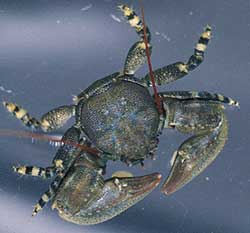 How animals respond to climate change will depend on their thermal habitats and their thermal phenotypes. The thermal phenotype of an organism (heat and cold tolerance, thermal range, and thermal plasticity) is an essential feature of how the organism performs across thermal environments and in response to thermal stress. Porcelain crabs are of interest in addressing questions of thermal phenotype because of their high species diversity and the large variation in thermal phenotype among species, as well as the biogeographic patterning of these crabs along latitudinal thermal stress gradients. This project entails the sequencing of cDNA libraries from one porcelain crab species, Petrolisthes cinctipes. These sequence data and cDNA microarrays will be used to comprehensively analyze the transcriptome responses to thermal acclimation and thermal stress in P. cinctipes as well as other species of Petrolisthes with different thermal phenotypes.
How animals respond to climate change will depend on their thermal habitats and their thermal phenotypes. The thermal phenotype of an organism (heat and cold tolerance, thermal range, and thermal plasticity) is an essential feature of how the organism performs across thermal environments and in response to thermal stress. Porcelain crabs are of interest in addressing questions of thermal phenotype because of their high species diversity and the large variation in thermal phenotype among species, as well as the biogeographic patterning of these crabs along latitudinal thermal stress gradients. This project entails the sequencing of cDNA libraries from one porcelain crab species, Petrolisthes cinctipes. These sequence data and cDNA microarrays will be used to comprehensively analyze the transcriptome responses to thermal acclimation and thermal stress in P. cinctipes as well as other species of Petrolisthes with different thermal phenotypes.
There is great potential for additional use of the crab cDNA library to be generated for this project. First, completion of the project will represent a substantial increase in resources for the crustacean genomics community. Although crustaceans are economically and scientifically important organisms and are widely used in research topics ranging from ecological to biomedical relevance, relatively little sequence information is available for crustacean expressed sequence tags (ESTs), and there are fewer good EST libraries available for scientific study. The libraries and sequence information that will be generated as a result of this project should be of value for crustacean biologists working across a broad range of scientific disciplines (e.g., physiology, developmental biology, biological rhythms, ecology, fisheries biology), as well as in studies of molecular evolution and phylogeography.
CSP project participants: Dr. Jonathon Stillman (Romberg Tiburon Center, San Francisco State Univ.).